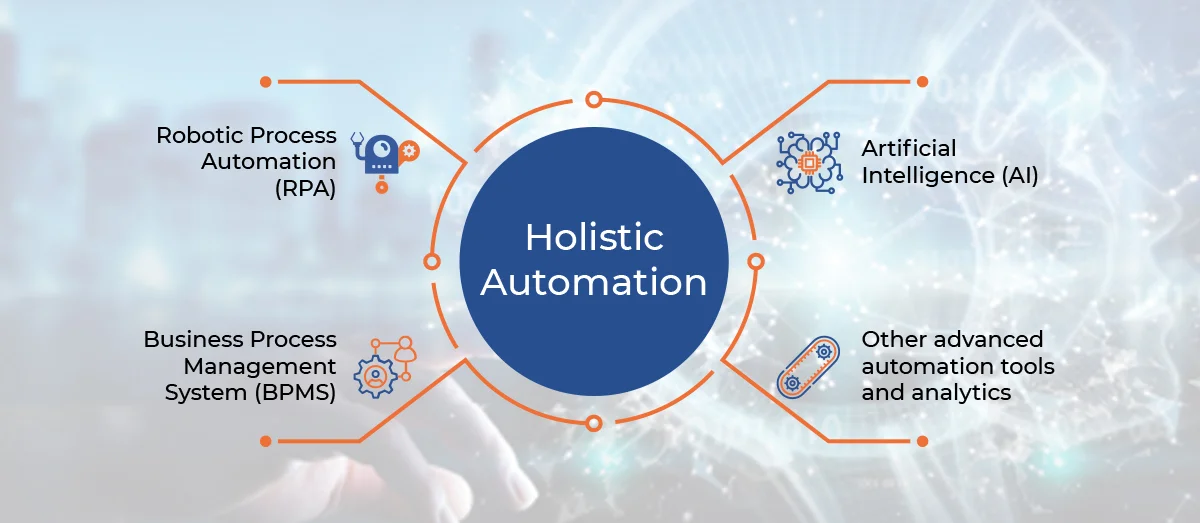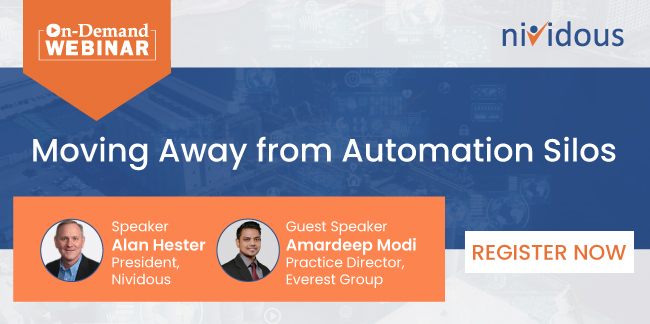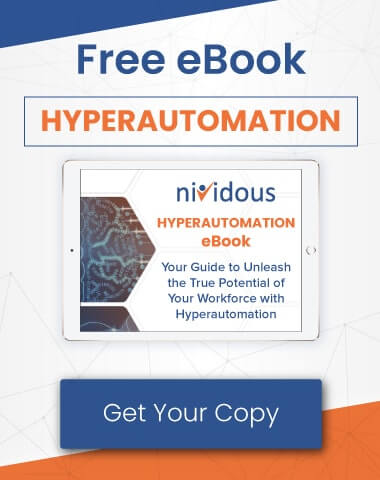The pandemic-led economic uncertainty in 2020 forced organizations to cut spending and focus on operational efficiency. As businesses rapidly adapt their business models, investments in advanced automation technologies have increased, despite the overall decrease in spending.
The early adopters of robotic process automation (RPA) and other digitally abled businesses started relying heavily on artificial intelligence (AI) and machine learning (ML) technologies to automate as much as possible to reduce human errors, interventions, and delays while improving process efficiency. Though AI and ML tools helped them achieve the fine balance of improving agility and reducing costs, businesses soon realized that a piecemeal approach to embedding automation tools cannot deliver long-term value.
Siloed automation may deliver short-term gains such as an immediate reduction in operational costs and faster processing time but cannot yield expected RoI in long run. It became evident that holistic automation is the only way forward to achieve sustained long-term value. Watch on-demand webinar to learn more about ‘How to move away from automation silos’
Holistic automation – the change driver
Holistic automation combines complementary automation technologies to achieve end-to-end automation. When RPA, AI, process mining, business process management, and other business automation tools are used in conjunction, the scope of automation is amplified. As more and more tasks are automated within the end-to-end process workflow, those business processes become more efficient, reliable, scalable, and easier to adapt. These benefits ultimately translate into a sustainable long-term gain as well as improved customer and employee engagement.
It is important to note that despite the amplified scope of automation, the human workforce is and will always be an integral part of business processes. Holistic automation allows better utilization of human intelligence for innovation and better outcomes, while automation tools are used to automate menial, and repetitive tasks.
Factors to keep in mind while adapting to holistic automation
- Tightly align automation to overall business strategy:
A fragmented approach to embedding automation tools will not help in achieving the desired results. Devise a holistic strategy by redefining the parameters that are crucial for the business and consider embedding automation across all business processes. - Keep humans at the core:
Though the success of any digital transformation initiative largely depends on the technology base, businesses should invest in those automation tools that allow proper work orchestration between humans and software bots. - Choose the right technology partner:
An easy way to get started is by collaborating with a technology vendor that offers native automation capabilities within one single platform. Technology vendors that depend on third-party integrations to deliver end-to-end automation can be comparatively expensive. - Educate and empower employees in your automation journey:
Build an effective program to educate employees about your digital transformation goals and train them for required skill sets as they become an integral part of your automation journey. A consensus-led approach to driving change can make the journey easier.
What do industry analysts say?
Leading industry analysts namely Gartner, Forrester, and Everest Group have unanimously emphasized the importance of holistic automation. The recent predictions shared by these analysts confirm the shift towards holistic automation.
As per Gartner, Predicts 2021: Accelerate Results Beyond RPA to Hyperautomation, “… far more than just robotic process automation (RPA) is needed to deliver resilient operational excellence. Organizations are shifting, or have shifted, to consume more impactful integrated hyperautomation technologies….”. Hyperautomation is a term coined by Gartner that suggests the use of RPA, AI, BPM, and other automation tools in conjunction.
As per Forrester, “AI adoption grew 15 percentage points in the past year, and maturity is rising as firms move past small, incremental deployments.” In 2021, digital transformation initiatives in more than three-quarters of enterprises will focus on automation—whether for core records, customer operations, or engagement, the firm said.
How Nividous can help you in adapting to holistic automation?
We, at Nividous, realized quite early that automation must be approached holistically and not siloed. Therefore, from day one we have focused on building a comprehensive business automation platform that harnesses the power of RPA, AI, and BPM. Having these three key pillars natively available in our platform is our key differentiator. Let us look at some of our success stories about how Nividous enabled holistic automation for leading businesses across different verticals.
Automation of the underwriting process for a leading insurer
The manual process of scrutinizing new proposals for underwriting is completely automated with the help of the Nividous platform.
- RPA Bots identify forms and documents for cases under scrutiny.
- Smart Bots with native Computer Vision-based OCR capabilities extract relevant data.
- RPA Bots validate the extracted data against an internal application and documents.
- RPA Bots take subsequent actions to manage change requests, approve/ pass the policy for issuance, pass the proposal to an underwriter for exception handling.
Automation of invoice processing for a leading manufacturer
The customer deployed Nividous Smart Bots to automate time-intensive and manual operations involved in the invoice processing and realized a 90% reduction in process turnaround time.
- The Bots with native machine learning capabilities read and understand data from several types of semi-structured and unstructured scanned/digital/image-based documents.
- The Bot presents the extracted data with a confidence score for human review; This built-in Human-Bot governance significantly expedites the invoice approvals.
- Once approved, the Bot feeds the extracted data into SAP ERP. The automation can be easily scaled up to manage an increasing number of invoices.
The demo video linked below showcases how templates for different types of invoices can be created within the Nividous platform for intelligent invoice processing.
Business models will continue to evolve as organizations rapidly accelerate the use of advanced automation technologies, but only those businesses are likely to gain a competitive edge who have built their automation goals keeping holistic approach at the core. If you want help with expediting your automation projects, we would love to connect with you and understand your goals. Get in touch with us at [email protected].
If you are interested to learn more about how to move beyond automation silos and embrace a holistic automation approach, watch on-demand webinar, featuring leading analyst Everest Group on “Moving Away from Automation Silos”.





![The Path Forward for Intelligent Automation [2024 Trends] Blog Feature](https://nividous.com/wp-content/uploads/2024/05/The-Path-Forward-for-Intelligent-Automation-blog-feature-1.webp)
